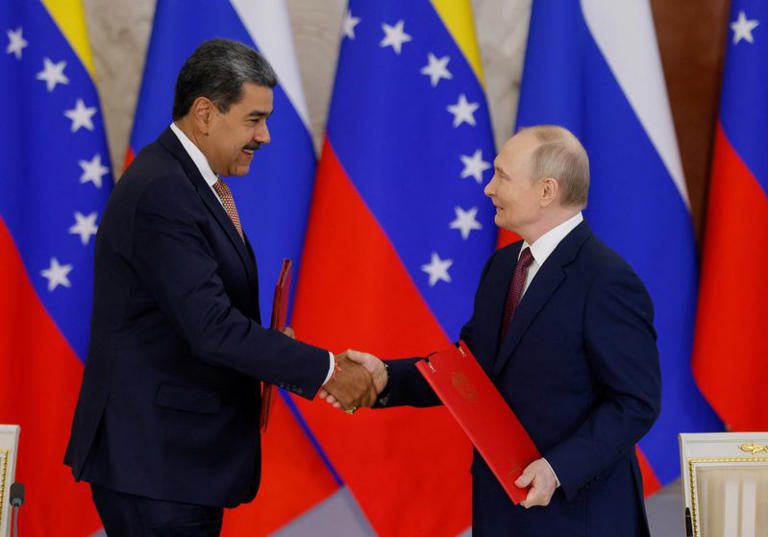Venezuela’s Nicolas Maduro and Russian President Vladimir Putin have publicly reaffirmed support for their nations with a strategic partnership agreement.
As reported by Reuters, Russia and Venezuela agreed to deepen cooperation in energy, including joint initiatives within OPEC+, the Gas Exporting Countries Forum, and other sector bodies. They pledged to support stable global energy markets, expand oil and gas ventures, and boost oil trading. The deal also outlines closer collaboration at the United Nations, in arms control, and coordinated resistance to unilateral sanctions.
Given Maduro’s penchant to pull from Putin’s playbook, the move raises some eyebrows, especially because of Guyana’s border controversy with Venezuela.
Both countries await a decision from the International Court of Justice to put the more than decade-long issue to bed. Venezuela participates but does not recognize the authority of the World Court. Nor does it respect and adhere to the agreements signed to keep the peace. All while labelling Guyana’s response to its tactics as provocative. Seems familiar? Putin does the same on his side of the globe. Analysts from the Center for Strategic and International Studies (CSIS) labelled Maduro Latin America’s very own Putin.
And it should come as no surprise that Venezuela cozied up to Russia again. The U.S. cut a major lifeline to its economy recently after axing the Chevron deal. It was a deadly blow to the country’s already fragile oil sector. Rystad Energy had predicted that Venezuela would turn back to Russia, China and Iran to deepen energy ties. And may I remind what these three nations have in common? A major disdain for U.S. hegemony.
And Guyana has the U.S. flexing its muscles behind it. The U.S. Secretary of State, Marc Rubio on a recent visit to Guyana, declared that Maduro would have a “very bad day” if he attempts to inflame the controversy further with an attack. Guyana also has support from the wider international community.
The last brazen act from Venezuela was on March 1, when a Venezuelan Navy vessel entered Guyana’s EEZ and sailed past a few oil assets, including the Prosperity FPSO.
Then, on March 25, he held elections to select a Governor and legislators for Guyana’s Essequibo territory. Even though there is an order in place from the World Court that mandates it not to. With this move, Maduro – taking notes from his buddy Putin, shows that he is willing to press the accelerator on the controversy, before the matter is concluded at the World Court.
Further escalating tensions, last May 13 and 14, the Guyana Defense Force (GDF) troops came under attack by armed men in civilian clothing on the Venezuelan side of the Cuyuni River.
Guyana should not view the Venezuela-Russia partnership renewal as an immediate threat, but it would be unwise to dismiss its implications altogether. Maduro’s pivot back to Moscow was predictable, driven more by economic desperation than strategic calculation. Yet history has shown that desperation can breed unpredictability, particularly with a leader who, like Putin, regularly disregards international norms.
Maduro’s renewed embrace of Russia gives him access to diplomatic, military, and economic support from a powerful ally that has a track record of undermining international law. While Guyana enjoys the backing of the U.S. and key international players, it must remain vigilant. Diplomatic engagement, regional alliances, and military preparedness should continue to be core components of its response strategy. In short, Maduro may be playing to a familiar script, but the stakes for Guyana are real. Caution not panic, should guide its next steps.
About the case:
The ICJ is currently considering the validity of the 1899 Arbitral Award that established the boundary between Venezuela and then-British Guiana. Venezuela accepted the award for decades before declaring it null and void in 1962, and has now extended its claim to offshore waters that include portions of Guyana’s Exclusive Economic Zone (EEZ) rich in oil and gas.



